专题十:语法填空与从句【2024高分攻略】高考英语二轮专题复习课件
文档属性
| 名称 | 专题十:语法填空与从句【2024高分攻略】高考英语二轮专题复习课件 |  | |
| 格式 | ppt | ||
| 文件大小 | 3.6MB | ||
| 资源类型 | 试卷 | ||
| 版本资源 | 通用版 | ||
| 科目 | 英语 | ||
| 更新时间 | 2023-12-30 09:34:00 | ||
图片预览

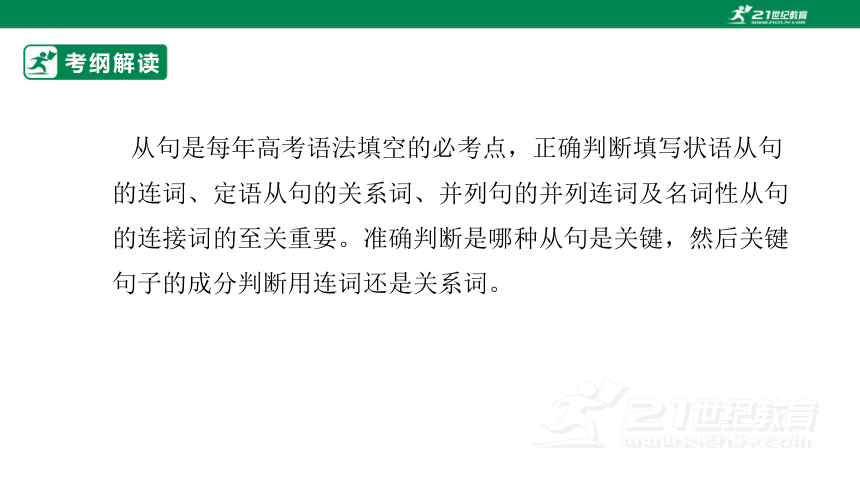
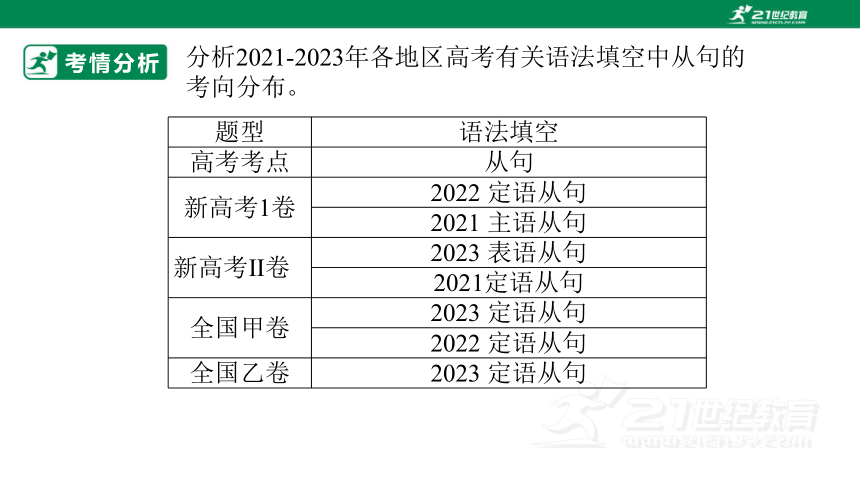
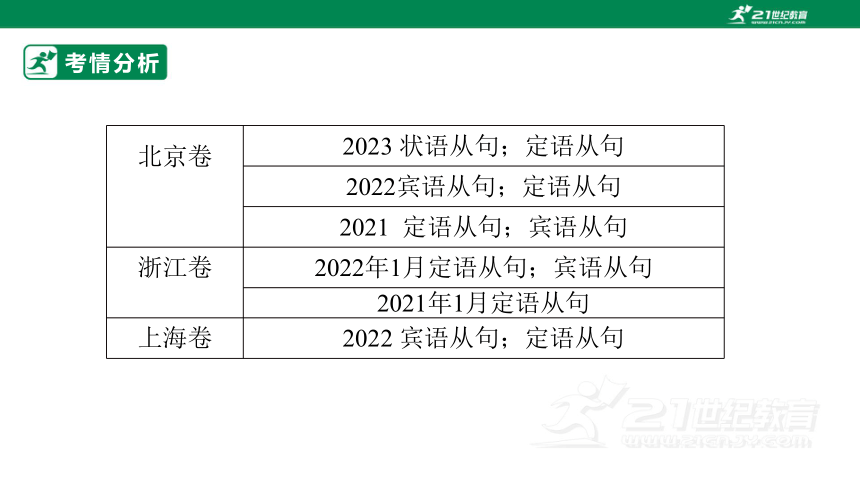
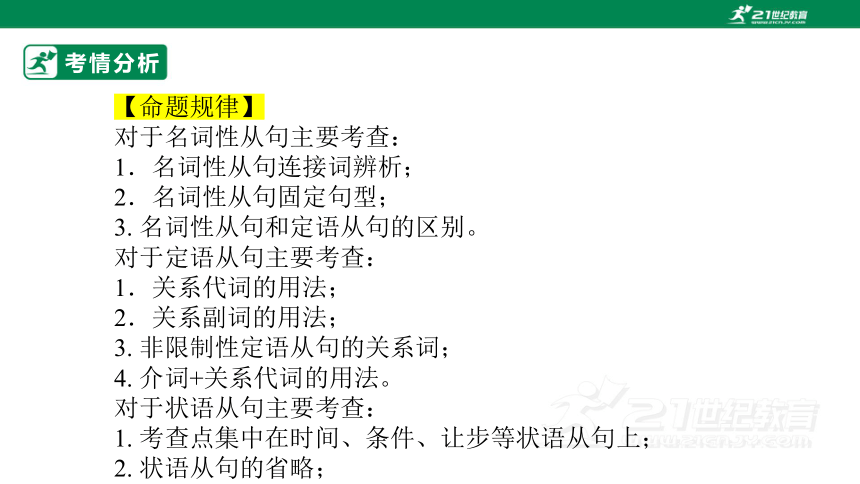
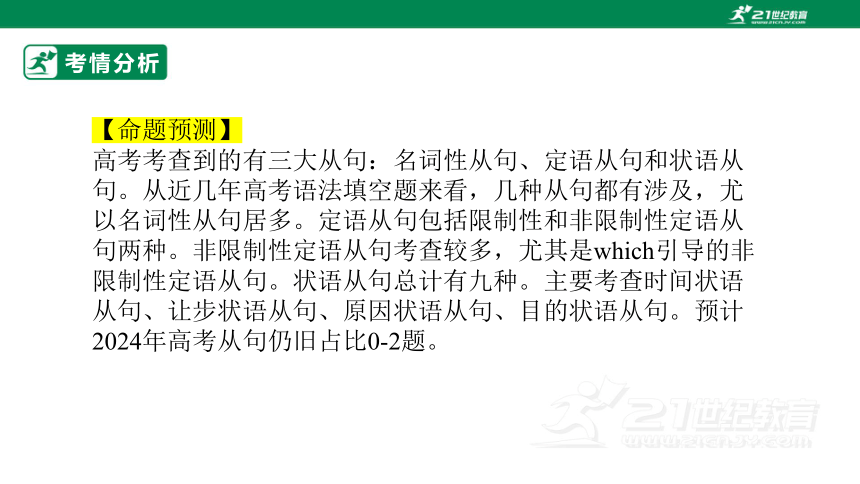
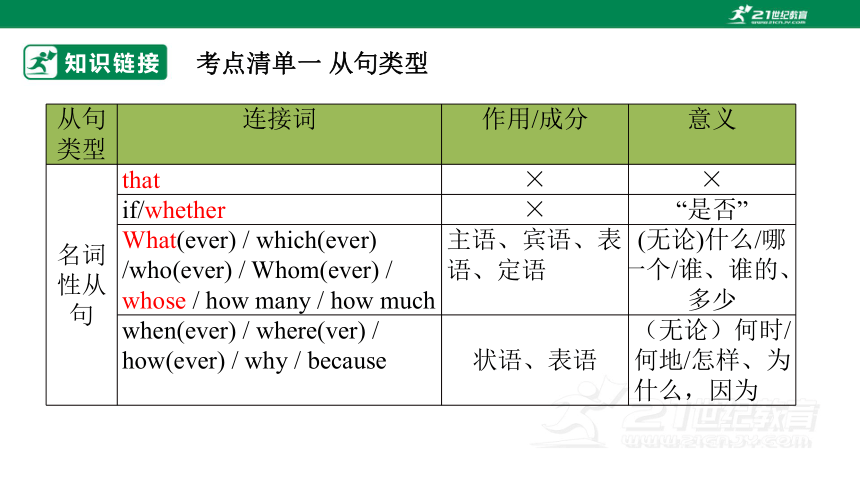
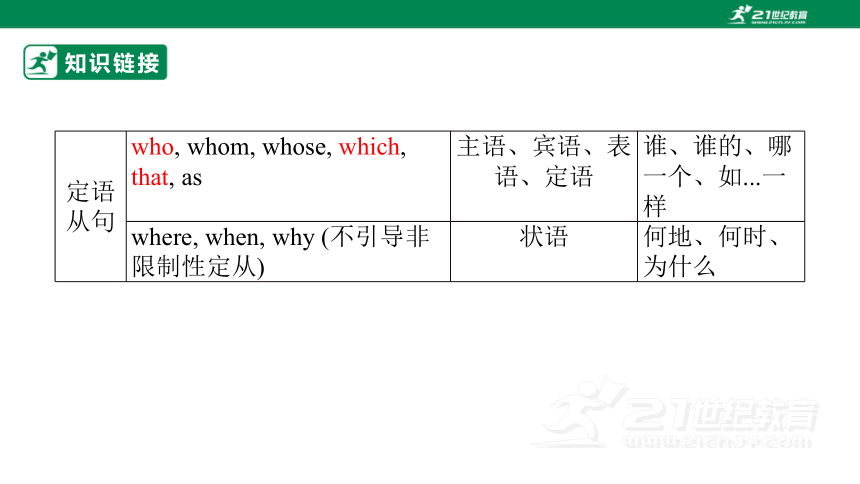
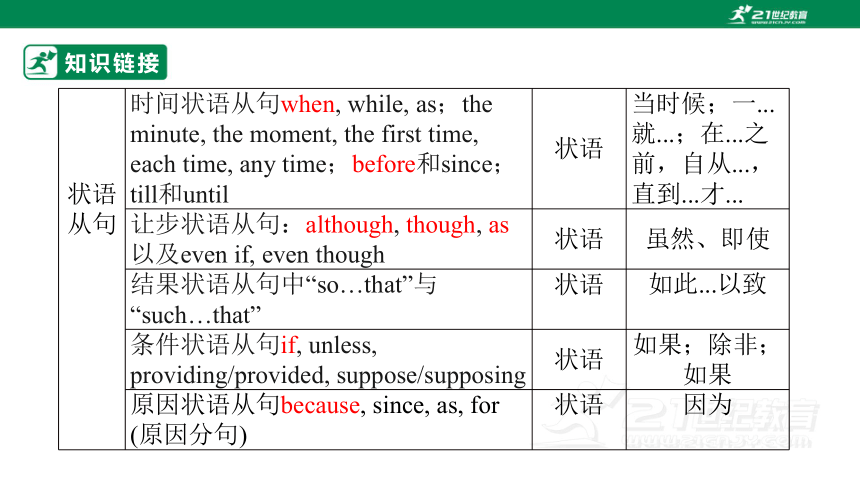
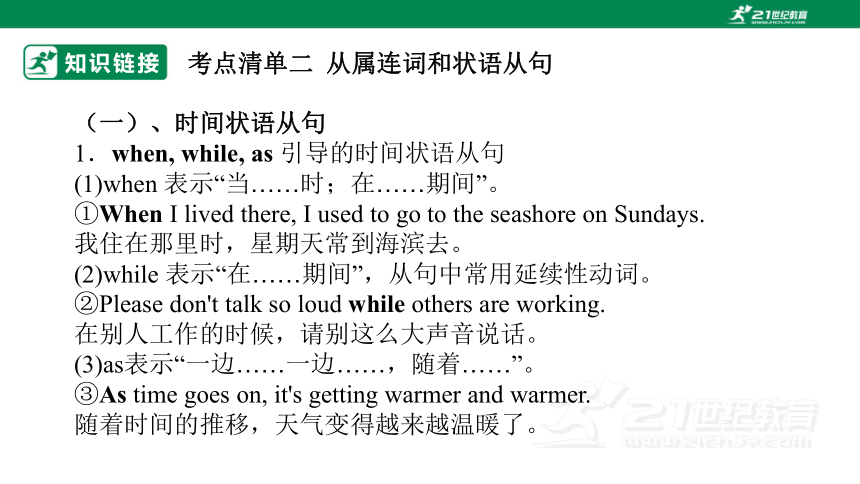
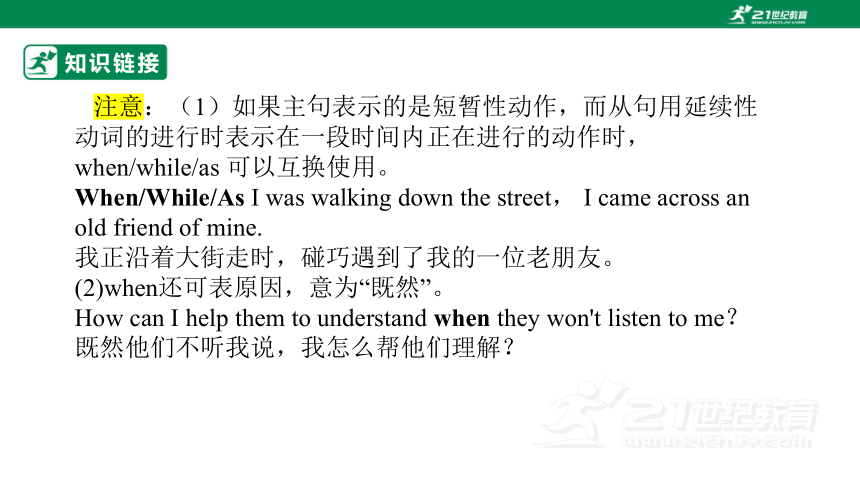
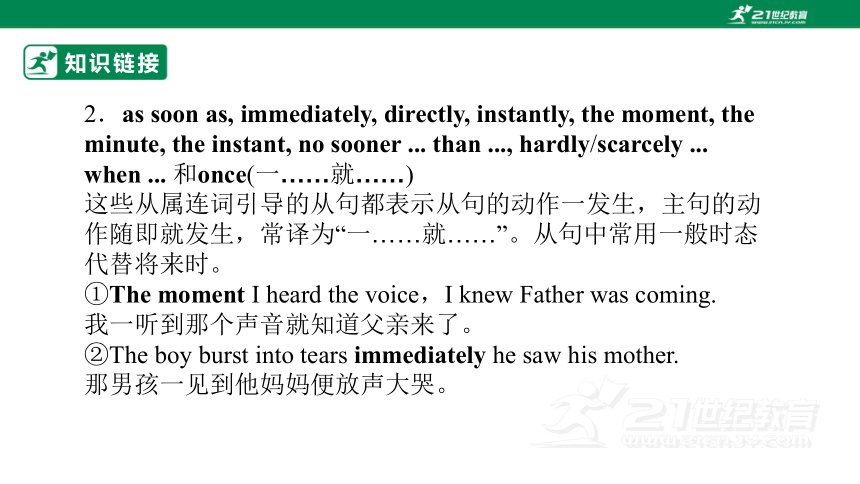
文档简介
(共96张PPT)
高考英语二轮复习(通用版)
从句与语法填空
考纲解读
从句是每年高考语法填空的必考点,正确判断填写状语从句的连词、定语从句的关系词、并列句的并列连词及名词性从句的连接词的至关重要。准确判断是哪种从句是关键,然后关键句子的成分判断用连词还是关系词。
考情分析
分析2021-2023年各地区高考有关语法填空中从句的考向分布。
题型 语法填空
高考考点 从句
新高考1卷 2022 定语从句
2021 主语从句
新高考II卷 2023 表语从句
2021定语从句
全国甲卷 2023 定语从句
2022 定语从句
全国乙卷 2023 定语从句
考情分析
北京卷
2023 状语从句;定语从句
2022宾语从句;定语从句
2021 定语从句;宾语从句
浙江卷
2022年1月定语从句;宾语从句
2021年1月定语从句
上海卷 2022 宾语从句;定语从句
考情分析
考情分析
知识链接
考点清单一 从句类型
从句类型 连接词 作用/成分 意义
名词性从句 that × ×
if/whether × “是否”
What(ever) / which(ever) /who(ever) / Whom(ever) / whose / how many / how much 主语、宾语、表语、定语 (无论)什么/哪一个/谁、谁的、多少
when(ever) / where(ver) / how(ever) / why / because 状语、表语 (无论)何时/何地/怎样、为什么,因为
知识链接
定语从句 who, whom, whose, which, that, as 主语、宾语、表语、定语 谁、谁的、哪一个、如...一样
where, when, why (不引导非限制性定从) 状语 何地、何时、为什么
知识链接
状语从句
时间状语从句when, while, as;the minute, the moment, the first time, each time, any time;before和since;till和until 状语 当时候;一...就...;在...之前,自从...,直到...才...
让步状语从句:although, though, as以及even if, even though 状语 虽然、即使
结果状语从句中“so…that”与“such…that” 状语 如此...以致
条件状语从句if, unless, providing/provided, suppose/supposing 状语 如果;除非;如果
原因状语从句because, since, as, for (原因分句) 状语 因为
知识链接
(一)、时间状语从句
1.when, while, as 引导的时间状语从句
(1)when 表示“当……时;在……期间”。
①When I lived there, I used to go to the seashore on Sundays.
我住在那里时,星期天常到海滨去。
(2)while 表示“在……期间”,从句中常用延续性动词。
②Please don't talk so loud while others are working.
在别人工作的时候,请别这么大声音说话。
(3)as表示“一边……一边……,随着……”。
③As time goes on, it's getting warmer and warmer.
随着时间的推移,天气变得越来越温暖了。
考点清单二 从属连词和状语从句
知识链接
知识链接
2.as soon as, immediately, directly, instantly, the moment, the minute, the instant, no sooner ... than ..., hardly/scarcely ... when ... 和once(一……就……)
这些从属连词引导的从句都表示从句的动作一发生,主句的动作随即就发生,常译为“一……就……”。从句中常用一般时态代替将来时。
①The moment I heard the voice,I knew Father was coming.
我一听到那个声音就知道父亲来了。
②The boy burst into tears immediately he saw his mother.
那男孩一见到他妈妈便放声大哭。
知识链接
知识链接
(2)“on+v. ing”和“on+one's+n.”结构。当v. ing和n.在意义上相对应时,这两个结构可以互换。
On arriving the station, the thief was arrested.
刚到火车站,这个小偷就被逮捕了。
On his arrival in Paris he was recognized as a noble and thrown into prison.
他刚到巴黎,就被认出是位贵族并被投入监狱。
知识链接
3.till, until和not ... until引导的时间状语从句
(1)“延续性动词(肯定式)+until/till”表示“动作延续到……为止”。
①We walked along the river until/till it was dark.
我们沿着河散步,一直到天黑。
(2)“瞬间动词/延续性动词(否定式)+until/till”表示“直到……才发生”。
②He didn't know anything about it until/till I told him.
直到我告诉他,他才知道这件事。
(3)强调句型:It is/was not until ... that ...
③It was not until the professor came that we began the experiment.
直到教授来了,我们才开始做实验。
知识链接
知识链接
4.before与since引导的时间状语从句
(1) before与since的常用句式。
连词 词义 常用句式
before 在……之前;还未……就……;……才……;还没来得及……就…… It will be+一段时间+before ... 过……时间才……
It will not be/was not long+before ... 不久就会/没多久就……
It was+时间段+before ... 过了……(时间)才……
since 自从……以来,…… It is/has been+一段时间+since ... (从句用一般过去时)
It was+一段时间+since ... (从句用过去完成时)
知识链接
①Some time passed before my stepfather and I got used to each other.(……之后才……)
继父和我相处一段时间后才彼此习惯。
②Someone called me up in the midnight, but he hung up before I could answer the phone.(还没来得及……就……)
有人半夜给我打电话,但我还没来得及接就挂断了。
③It will be two years before he leaves the country.
再过两年他才会离开这个国家。
知识链接
(2) since引导的从句如果用非延续性动词,所表示的动作自从句谓语动词所表示的动作开始时算起;若用延续性动词,所表示的动作自从句谓语的动作或状态的完成或结束时算起。
④It's two years since we arrived here.
我们到这儿两年了。
⑤It's three years since we lived here.
我们不住在这里有三年了。
知识链接
5.“It+be+时间+从句”句型
“It+be+时间+从句”句型是高考考查的热点,其中连接词的选择是个难点。突破这个难点的关键是要把握好句意,根据句意的需要选择合适的连接词:
(1)表示“再过多长时间某事才会发生”,用“It will be+时间段+before从句”。
①It will be three weeks before we have the next exam.
再过三周我们就要进行下一次考试了。
知识链接
(2)表示“自……以来有多长时间了”,用“It be+时间段+since从句”,如果主句用一般现在时,从句用一般过去时;如果主句用一般过去时,则从句用过去完成时。
②It is three years since he joined the army.
自从他参军以来已经三年了。
③He said it was three years since he had joined the army.
他说他参军已三年了。
知识链接
(3)“It be+时间状语+that+其他”构成强调句型,意思是“正是在某一时间发生了某事”。
④It was at six o'clock that we got home.
正是在六点我们到了家。
(4)“It be+时间点+when从句”表示“某事发生在什么时间”,it指代时间。
⑤It was six o'clock when we got home.
当我们到家的时候六点了。
知识链接
6.every time, each time, next time, the last time等名词短语用来引导时间状语从句,表示“每当……,每次……,下次……,上次……”等
①Every/Each time I was in trouble, he would come to help me out.
每当我处于困境,他就会来帮助我。
②Next time you come, do remember to bring your son here.
下次你来的时候,一定记着把你儿子带来。
③The last time she saw James, he was lying in bed.
上次她看见詹姆斯的时候,他正躺在床上。
知识链接
(二)、条件状语从句
1.if和unless引导的条件状语从句。if表示正面的条件,意为“如果”;unless(=if ... not)表示反面的条件,意为“除非,如果不”。
①If you had come a few minutes earlier, you would have met him.
要是你早来几分钟就碰到他了。
②You'll fail the exam unless you study hard(=if you don't study hard).
除非你努力学习,否则你考试会不及格。
知识链接
2.in case, on condition that, providing(that), provided (that),supposing (that), suppose (that)等词汇意思相近,意为“万一,假使,假如,在……条件下”。
①In case there is a fire, what will we do first
万一发生火灾,我们首先要做什么?
②Suppose/Supposing(that) they refuse us, who else can we turn to for help
假如他们拒绝了我们,我们还能求助于谁?
③They agreed to lend us the car on condition that we returned it before the weekend.
他们同意把车借给我们,条件是我们在周末前归还。
知识链接
3.as long as(=so long as)引导语气强烈的条件状语从句,意为“只要”。
As long as you don't lose heart, you will succeed.
你只要不灰心,就会成功。
4.在“祈使句+and/or/or else/otherwise+陈述句”句型中,祈使句在意义上相当于条件状语从句。
①Run faster and you'll catch the bus.
跑快点,你就会赶上公共汽车的。
②Work hard, otherwise you'll fail.
努力干,要不你就会失败的。
知识链接
5.if only “如果……就好了”和only if “只有”也可以引导条件状语从句。但是当only if置于句首时,主句部分倒装。
①If only I were as clever as you.
我要是像你一样聪明就好了。
②Only if a teacher has given permission is a student allowed to leave the classroom.
学生只有得到老师的许可才能离开教室。
知识链接
(三)、让步状语从句
1.although/though(尽管,虽然),even though/even if(即使)引导的让步状语从句
although与though两者意思相同,一般可互换,都可以与yet, still或nevertheless连用,但不能和but连用。
①He is unhappy, though/although he has a lot of money.
虽然他很有钱,但他并不幸福。
②Although/Though it was raining hard, yet they went on playing football.
虽然雨下得很大,但他们还是继续踢足球。
③Even though/if it rains tomorrow, we'll go there.(陈述语气)
即使明天下雨,我们也要去那里。
知识链接
知识链接
2.as或though引导让步状语从句时倒装的情况
as或though从句一般放在主句之前,常用倒装语序。从句中的表语、状语或动词原形置于句首。若表语是单数名词,前置时要省略冠词。
①Child as/though he is, he can tell the names of all the cars.
尽管他是孩子,但他能辨认出所有车的名字。
②Much as/though I like it, I won't buy it, for it's too expensive.
虽然我很喜欢它,但不会买,因为它太贵了。
知识链接
知识链接
4.while也可作从属连词引导让步状语从句,相当于although
While I admit that there are problems, I don't agree that they cannot be solved.
尽管我承认有问题存在,但我并不认为这些问题不能解决。
知识链接
(四)、地点状语从句
1.地点状语从句是指在复合句中作地点状语的从句,表示空间关系,可置于句首、句中或句末,通常由从属连词where, wherever等引导。
①We should go where the Party needs us most.
我们应到党最需要我们的地方去。
②You are free to go wherever you like.
你愿意去哪里就去哪里。
③Where there is a will, there is a way.
有志者,事竟成。
④Wherever there is smoke, there is a fire.
无火不生烟。(无风不起浪)
知识链接
知识链接
(五)、原因状语从句
1.引导原因状语从句的连词主要有:because, as, since等。并列连词for也可表示原因。每个连词的含义不尽相同。
连词 位置 内涵 语气 能否回答why 能否被强调
because(因为) 主句前或后 直接因果关系 强 能 能
as(由于) 主句前或后 双方都知道的原因 弱 不能 不能
since/now that(既然) 通常位于主句前
for(因为) 位于句后 用于补充说明的原因 弱 不能 不能
知识链接
①He was criticized by the teacher, because he was late for class.
因为他迟到了,老师批评了他。
②I can't go with you, as I have a lot of work to do.
我不能和你一起去,因为我有很多工作要做。
③Now that/Since everyone is here, we can begin our discussion.
既然大家都在这儿,我们可以开始讨论了。
知识链接
2.when(既然),seeing that (鉴于,由于),considering that (考虑到),in that(因为)等也可以引导原因状语从句。
①It was foolish of you to take a taxi when you could walk there in five minutes.
既然步行5分钟就能到那里,你却去乘出租汽车,真够愚蠢的。
②Seeing that there were less than half the members present, the meeting had to be postponed.
鉴于到会的成员还没一半,会议只好延期举行。
知识链接
(六)、目的状语从句
引导目的状语从句的连词有:so that, in order that, for fear that, in case (以防),lest等。
1.so that与in order that
这两个连词都表示“为了,以便”,引导的目的状语从句常与情态动词can, could,may, might等连用。in order that引导的从句可以置于主句之前或之后,而so that引导的从句只能置于主句之后。
①I am studying hard so that/in order that I can enter a famous university.
为了能上一所名牌大学,我一直努力学习。
②In order that we could save time we used the computer.
我们使用计算机是为了节省时间。(此时不可使用so that)
知识链接
2.for fear that表示“生怕,以免”,in case表示“以防”。
①Batteries must be kept in dry places for fear that electricity should leak away.
电池应该放在干燥的地方,以免漏电。
②I'll keep a seat for you in case you should change your mind.
我给你留个座位,没准儿你会改变主意。
知识链接
(七)、结果状语从句
常用来引导结果状语从句的引导词或短语有so that, so ... that ... , such ... that ... 。
1.结构形式
知识链接
①There was so little food at home that we had to go out to buy some.
家里快没食物了,我们只好出去买一些。
②Mike is such an honest worker that we all believe him.
→Mike is so honest a worker that we all believe him.
迈克是一个如此诚实的工人,以至于我们都相信他。
③He has made such rapid progress that he was praised by his teacher three times a day.
他取得了如此快的进步,以致老师一天表扬了他三次。
知识链接
知识链接
2.当so或such置于句首时,主句要用倒装语序。
①So clever a student was he that he was able to work out all the difficult problems.
他是一个如此聪明的学生,以至于他能解决所有的难题。
②Such was the force of the explosion that all the windows were broken.
爆炸的威力如此巨大,以致所有的窗户都被震破了。
知识链接
3.so/such ... that ... 引导的结果状语从句与so/such ... as ... 引导的定语从句的区别。
(1)so/such ... that ... 引导结果状语从句时,that在从句中不作任何成分,只起连接作用。
①It is such a moving film that we all want to see it.
这是一部如此感人的电影,以至于我们都想去看。
(2)so/such ... as ... 中,as引导定语从句,as在从句中作主语或宾语。
②It is such a moving film as we all want to see.
这是一部感人的、我们都想看的电影。
知识链接
(八)、方式状语从句
1.方式状语从句常由as, just as, as if/though等引导,多置于主句之后。
①You ought to write as he does.
你应该像他那样写。
②He did as (he had been) told.
他遵嘱而行。
2.as if或as though引导的方式状语从句一般用虚拟语气,但如果从句所陈述的情况很可能实现,也可用陈述语气。
①He likes to talk big as if/though he were an important person.
他老爱说大话,就仿佛他是一位重要人物似的。
②He walked as though/if he was drunk.
他走起路来就像喝醉了一样。
知识链接
(九)、比较状语从句
1.as ... as ...; not so/as ... as ...; the same ... as ... 表示相同程度的比较,肯定句用as ... as ...,否定句可用not as ... as或not so ... as。
He doesn't run so/as fast as Jack (does).
他跑得不如杰克快。
2.than表示不同程度的比较,主句中用形容词或副词的比较级。
①He runs less fast than me.
他跑得没我快。
②It was more expensive than I thought.
它比我想象的要贵。
3.the+比较级,the+比较级,表示“越……就越……”
The more you eat, the fatter you will be.
吃得越多,你将越胖。
知识链接
连接词的基本用法
从属连词 主语从句 宾语从句 表语从句 同位语从句
在从句中作动宾 在从句中作介宾
that 不能省略 一般可以省略 不能省略 不能省略 不能省略
whether/if 放在句首用whether 均可使用但有区别 只能用whether 只能用whether 只能用whether
考点清单三 名词性从句
知识链接
疑问连词(即疑问代词和疑问副词)
1.疑问代词有:what, who, which, whose, whatever, whoever, whomever, whichever;2.疑问副词有:where, when, why, how, wherever, whenever.由疑问连词(即疑问代词和疑问副词)引导的名词从句要用陈述句语序:
知识链接
引导名词从句的连接词有下列特点
连接词 特 点
从属连词that 只起连接作用,在名词从句中不作任何成分,也没有具体的意思。
从属连词whether/if 只起连接作用,在名词从句中不作任何成分,但是有具体的意思,译为“是否”。
疑问代词 不仅起连接作用,在名词从句中作主语、宾语、表语或定语等成分,有具体的意思。
疑问副词 不仅起连接作用,在名词从句中作状语,有具体的意思。
知识链接
一、 名词性从句的不同类型及其结构
名词性从句包括主语从句、宾语从句、表语从句和同位语从句,它是一种具有名词功能的非独立分句。
1.主语从句
①That you are coming to London is the best news I have heard this long time.
这么长时间以来我听到的最好的消息就是你要来伦敦。
②What matters most in learning English is enough practice.
学习英语最重要的是足够的训练。
③It is none of your business what other people think about you. Believe yourself.
其他人怎么认为你,不关你的事,你尽管相信你自己。
知识链接
④It is obvious to the students that they should get well prepared for their future.
显而易见,学生应该为他们的未来做好充分准备。
主语从句的结构:
(1)(连接词+主语+谓语+其他)+主句谓语+其他。
(2)It(形式主语)+主句谓语+其他+(连接词+主语+谓语+其他)。
知识链接
2.宾语从句
①I'm afraid (that) I can't accept your invitation.
恐怕我不能接受你的邀请。
②Tom is a nice boy except that he is sometimes late for school.
汤姆除了有时候上学迟到外,是个很不错的男孩。
③I find it necessary that we should spend more time practising spoken English.
我发现花更多时间练习英语口语是必要的。
④I don't think that you should go abroad in the future.
我认为你将来不应该出国。
知识链接
宾语从句的结构:
(1)及物动词(短语)/介词+连接词+从句主语+从句谓语+其他。
(2)及物动词+it+宾补+连接词+从句主语+从句谓语+其他。
(3)表示情感的形容词+连接词+从句主语+从句谓语+其他。
知识链接
3.表语从句
①My decision is that all of us are to start at 6 o'clock tomorrow morning.
我的决定是我们所有人明天早上6点出发。
②The reason for his absence is that his daughter suddenly fell ill.
他缺席的原因是他的女儿突然病了。
③As is known to us, China is no longer what she used to be.
众所周知,中国再也不是从前的样子了。
④One reason for her preference for city life is that she can have easy access to places like stores and restaurants.
她偏爱城市生活的一个原因是她可以很方便地进入像商店和饭店这样的地方。
知识链接
表语从句的结构:
系动词+连接词+从句主语+从句谓语+其他。
知识链接
4.同位语从句
①They made an official request that the meeting be postponed.
他们已经正式请求将会议推迟。
②The problem whether we should continue to do the experiment has been solved.
我们是否应该继续做实验的问题已经解决了。
③I have no idea when he will come back.
我不知道他将何时回来。
④I made a promise to myself that this year, my third year in Senior school, would be different.
我向自己保证:今年——我高中的第三年——将会是不同的一年。
知识链接
同位语从句的结构:
名词+连接词+从句主语+从句谓语+其他。
知识链接
二、 名词性从句的连接词
名词性从句的常见连接词有:that, whether, what, which, who, whom, whatever, whichever, whoever, whomever, when, where, why, how, how many, how much等,根据其在从句中的功能可分为三类
知识链接
1.从句中缺少主语或宾语时,选择以下连接词:what(ever), which(ever), who(ever), whom(ever)。通常情况下,which是在语境中提供了范围才会使用,否则,指事物时使用what(ever)。
①What was most important to her, she told me, was her family.(主语从句,what在从句中作主语)
她告诉我,对她来说最重要的是她的家人。
②The employers often give the job to whoever they believe has work experience with a strong sense of duty.(宾语从句,whoever在从句中作主语)
雇主们经常会把工作给他们认为有工作经验并且有强烈责任感的人。
③Whichever book he bought would be paid for.
无论他买了哪一本书,都要付款。
知识链接
2.从句中不缺少主语或宾语,而是缺少状语成分,此时则用when, where, why, how, how many/much等带有语义的连接词。
①Some students even have no idea why they are studying, so they waste much time playing.(同位语从句,缺语义,连接词在从句中作原因状语)
一些学生甚至都不知道为什么学习,所以他们浪费很多时间玩儿。
②She always thinks of how she can work well. (宾语从句,缺语义,连接词在从句中作状语)
她总是在想怎样能把工作做好。
③Where the English evening will be held hasn't yet been announced. (主语从句,缺语义,连接词在从句中作状语)
英语晚会将在哪里举行,还没有宣布。
知识链接
3.从句中既不缺少成分,又语义完整,则用连接词that。
①It is decided that the meeting has been put off till next Monday. (主语从句,不缺成分和语义)
已经决定将会议推迟到下周一。
②He gave us a suggestion that we should practise speaking English in class. (同位语从句,不缺成分和语义)
他建议我们在课堂上练习说英语。
③Tom has admired my daughter for a long time, but the question is that she doesn't love him at all.(表语从句,that不作任何成分,无语义,只起连接作用)
汤姆已经爱慕我女儿很久了,然而问题是我女儿一点也不爱他。
知识链接
三、 名词性从句的疑难点
1.that不可省略的情况
(1)that引导主语从句且从句置于句首时,that不可省略。
①That he failed in the exam made his parents disappointed.
他考试不及格,这使他父母很失望。
(2)that引导表语从句或同位语从句时,一般不可省略。
②The truth is that I didn't go there.
事实是我没有去那里。
③The news that our team has won is true.
我们队赢了的消息是真的。
知识链接
(3)当that引导的从句作介词的宾语时,that通常不能省略。
④They share little in common except that they are from the same country.
除了来自同一个国家之外,他们几乎没有共同点。
(4)当主句谓语后接两个或两个以上的宾语从句时,可以省略第一个that,其他的that不可省略。
⑤I believe (that) you've done your best and that things will get better.
我相信你已经尽力了,而且情况会好起来的。
(5)当it作形式宾语时,在that引导的宾语从句中,that也不可省略。
⑥He has made it clear that he will not give in.
他不会屈服的,他已经表明了这一点。
知识链接
(6)当that引导的宾语从句与主句谓语动词之间有插入语或与从句主语之间有插入语时,that通常不可省略。
⑦He announced, believe it or not, that he would never forgive her.
信不信由你,他宣布他绝不会原谅她。
2.wh ever和no matter wh 的区别
wh ever既可以引导名词性从句,又可以引导让步状语从句,而no matter wh 只能引导让步状语从句。
①I will give this dictionary to whoever wins the first prize in the English contest.(宾语从句)
我将把这本字典赠给在英语竞赛中获得一等奖的人。
②Whoever/No matter who wins the first prize in the English contest, I will give this dictionary to him.(状语从句)
不管谁在英语竞赛中获得一等奖,我都会把这本字典赠给他。
知识链接
3.表示“要求,建议,命令;坚持”的词后跟名词性从句时,从句中的谓语动词用“should+do”,其中should可以省略
①The boss ordered that the task (should) be completed by noon.(宾语从句)
老板命令(我们)在中午之前完成任务。
②The doctor's advice is that I (should) rest more and drink more.(表语从句)医生建议我多休息、多喝水。
③It was proposed that this matter (should) be discussed at the next meeting.(主语从句)
有人提议这事在下次会议上讨论。
④The boss refused the demand that she (should) do the work alone.(同位语从句)
老板拒绝了她单独做那项工作的请求。
知识链接
4.宾语从句的时态
(1)主句的谓语动词如果是一般现在时或一般将来时,从句的谓语动词可用任何所需要的时态。
①He says that he studies at school from Monday to Friday.
他说他从周一至周五都在学校学习。
②I know that she didn't tell you that she would go to America next month.
我知道她没有告诉你她下个月要去美国。
③He will tell us what happened to him during our absence.
他会告诉我们,我们不在期间他出了什么事。
知识链接
(2)主句的谓语动词是一般过去时时,从句的谓语动词通常用相应的过去时。
④The boy said that there were no classes on Sunday afternoon.
那个男孩说周日下午没有课。
⑤My Chinese teacher asked me if I was reading the book Red and Black when he came in.
我的语文老师问我他进来时我是否在读《红与黑》这本书。
(3)如果从句表示客观事实或真理,不管主句的谓语动词是何种时态,从句都要用一般现在时。
⑥As a child, I was told that the moon has no light of its own. I didn't believe it.
孩提时,人们告诉我月亮自身不会发光,我不相信。
知识链接
知识链接
1.定义:在复合句中,修饰限定某一名词(或代词)的句子,叫定语从句。
2.先行词:被定语从句修饰的词称为先行词。
先行词一般是名词或不定代词,如:some , any , every , no 与 body, thing的合成词或all, none, any, some, that, those等代词。数词和人称代词也同样可作先行词。
3.关系词:连接先行词与从句的词叫关系词。
关系代词:who, whom, which, that, whose, as等。
关系副词:when, where, why等。
考点清单四 定语从句
知识链接
4.分类:定语从句分为限制性定语从句和非限制性定语从句两类。
区别:限制性定语从句对先行词起修饰限定作用,而非限制性定语从句对先行词起补充说明作用,先行词与定语从句往往由逗号隔开。试比较:
知识链接
5.功能:相当于形容词,修饰名词或代词,在句中作定语。
6.位置:定语从句常置于被修饰词之后;as引导的非限制性定语从句可置于主句前、句中,也可置于主句之后。
①Those who are for the plan raise your hands, please.
请支持这个计划的人举手。
②As is known to us all, the earth is spinning around the sun.
我们都知道,地球围绕太阳旋转。
知识链接
一、关系代词引导的定语从句
引导定语从句的关系代词有:that, which, who, whom, whose, as等,关系代词可作主语、宾语、定语等。
1.who, whom, that这些词代替的先行词是表示人的名词或代词,在从句中可作主语、宾语等。
I've made good friends with several of the students in my school who/whom/that I met in the English speech contest last year.
我已与去年在英语演讲比赛中遇到的我校的几个学生结交为好朋友。
知识链接
2.whose既可指人又可指物,在定语从句中作定语。指物时,“whose+名词”可用“the+名词+of which”或“of which+the+名词”来代替。
①Do you know the boy whose handwriting is very beautiful
你认识那个书法非常漂亮的男孩吗?
②I'd like a room whose window looks out over the sea.
→I'd like a room, the window of which looks out over the sea.
→I'd like a room, of which the window looks out over the sea.
我想要一个窗户朝向大海的房间。
知识链接
知识链接
(2)先行词被形容词的最高级或序数词(如:the first,the second, ...,the last等)修饰时。
③This is the best film (that) I have ever seen.
这是我看过的最好的电影。
(3)先行词被the only, the very, the right等修饰时。
④The only thing that matters is to find our way home.
唯一要紧的事情是找到我们回家的路。
(4)先行词既有人又有物时。
⑤They talked about the persons and things (that) they remembered in the school.
他们谈论起他们记得的学校里的人和事。
知识链接
知识链接
4.as引导的定语从句
A:as作为关系代词,在定语从句中缺少主语或宾语时使用,通常先行词由the same, as, such, so等修饰时,关系代词用as。
①They could only read such stories as had been rewritten in simple English.(as作主语)
他们只能读类似这样的一些用简易英语改写的故事。
②These houses are sold at such a low price as people expected.(as作宾语)
这些房子以人们期望的低价出售。
③This is the same knife as I lost.(as作宾语)
这把小刀和我丢的那把很相似。
知识链接
知识链接
B:关系代词as与which引导非限制性定语从句的区别
(1)位置不同
as引导的非限制性定语从句可以置于主句之前、之中或之后,而which引导的非限制性定语从句只能位于主句之后。
④As is often the case, little boys tend to be very active and out of control.
小男孩总是很活泼好动,很难控制,这是常见的情况。
⑤Einstein, as is well known, is a famous scientist.
众所周知,爱因斯坦是一位著名的科学家。
⑥There was a bank around here, as I remember.
我记得过去这儿附近有一家银行。
⑦He failed in the exam, which was unexpected.
他考试没及格,这是意料之外的。
知识链接
(2)意义不同
as常译作“正如,像”,多用于下列习惯用语中:as anybody can see “正如人人都能看到的那样”;as is well known=as is known to all “众所周知”;as we had expected “正如我们所预料的那样”;as often happens “正如经常发生的那样”;as is often the case “正如经常发生的那样”;as has been said before “如上所述”;as is mentioned above “正如上面提到的”;as I remember “正如我所记得的那样”。which常译作“这一点,这件事”,此时指前面主句所提到的那件事。
⑧He opposed the idea, as could be expected.
不出所料,他反对这个意见。
⑨Tom has made great progress, which makes his parents very happy.
汤姆进步很大,这使他父母很高兴。
知识链接
(3)用法不同
a.当非限制性定语从句是否定句或表示否定意义时,只能用which。
⑩He came here very late, which was unexpected/not expected.
他来得很晚,这是未预料到的。
b.当as在句中作主语时,后常接动词的被动语态,如:be known, be said, be reported等。如果从句中动词是主动语态,一般用which作主语。
She has been absent again, as is expected.
她又缺席了,正如预料的那样。
知识链接
二、关系副词引导的定语从句
当定语从句中不缺少主语、宾语、定语和表语时,要选用关系副词。其中when, where, why是常见的三个关系副词。
when=表时间的介词(如:in, on, at, during等)+which;
where=表地点的介词(如:in, at, on, under等)+which;
why=表原因的介词(如:for)+which。
知识链接
1.关系副词when, where, why的先行词是表示时间、地点或理由的名词,关系副词在从句中作状语。
①Nowadays people are more concerned about the environment where they live.
现在人们更加关心他们居住的环境。
②I'll never forget the day when my son was born.
我永远忘不了我儿子出生的那一天。
知识链接
知识链接
(2)先行词occasion当“时刻”讲时,用关系副词when;当“场合”讲时,用关系副词where。
Please describe an occasion where you met real difficulties.
请描述你遇到真正困境的场景。
Occasions are rare when I have the time to spend a day with my kids.
我有时间和孩子们度过一天的时机很少。
知识链接
2.way和time后接定语从句的情况。
(1)当先行词是way(意为“方式、方法”,且关系词在定语从句中作状语)时,引导定语从句的关系词可以是that, in which或省略。
①I don't like the way (that/in which) he looks at me.
我不喜欢他看我的方式。
(2)先行词是time时,若time作“次数”讲,应用关系代词that引导定语从句,that可省略;若time作“一段时间,时代”讲,应用关系副词when或“介词at/during+which”引导定语从句。
②This is the first time (that) I have talked with a foreigner face to face.
这是我第一次和一个外国人面对面交流。
③There was a time when I hated going to school.
曾经有一段时间我讨厌上学。
知识链接
知识链接
2.关系代词前介词的确定
(1)依据定语从句中动词或形容词的习惯搭配来确定。
①The fellow to whom I spoke made no answer at first.
我与之说话的那个人起初没有回答。(speak to)
②The West Lake, for which Hangzhou is famous, is a beautiful place.
西湖是一个美丽的地方,杭州因此而闻名。(be famous for)
(2)根据先行词来确定。
③I'll never forget the time during which I spent my childhood in the country.
我永远不会忘记我在乡村度过的童年时光。(during the time)
④Air, without which man can't live, is really important.
空气真的很重要,没有它人类就不能生存。(without air)
知识链接
3.“名词/代词+介词+关系代词”结构
此类结构常见的有“some/many/most/all/none+of+which/whom”等。
①Here are the questions, some of which I think are difficult for you.
问题都在这儿,其中一些我认为对你来说很难。
②He has three sons, none of whom are doctors.
他有三个儿子,没有一个是当医生的。
4.“复合介词短语+关系代词which”引导的定语从句,其从句部分常与先行词用逗号隔开,且从句部分常用倒装语序。
He lived in a big house, in front of which stood a big tree.
他住在一所大房子里,房子前面有一棵大树。
知识链接
易错失分项
1.whether与if的用法区别
(1)表语从句和同位语从句常用whether引导,不用if;当主语从句放于句首时,也常用whether引导,不用if;当it作形式主语,主语从句放在后面时用whether或if引导均可,但是如果被后置的主语从句中含有表选择意义的or时,必须用whether;与or not直接连用时,也必须用whether。
①Whether the meeting will be held is still a problem.(主语从句放于句首)
是否要开会仍然是个问题。
→The problem is whether the meeting will be held.(表语从句)
问题是是否将举行会议。
→I have no idea whether the meeting will be held.(同位语从句)
我不知道是否将举行会议。
易错失分项
②It is doubtful whether/if he will come here.(主语从句放于句末)
他是否要来这儿还令人怀疑。
③It makes no difference whether he comes or not.
他来不来无关紧要。
(2)whether和if都可以引导宾语从句,表示“是否”,在口语或间接引语中两者可以互换使用,但在有些情况下,whether和if的用法有一定的区别。
a.在及物动词后
(×)I don't care whether he doesn't come.(whether从句中不能用否定式)
(√)I don't care whether he comes or not.
(√)I don't care whether or not he comes.
(×)I don't care if or not he comes.(if不与or not直接连用)
(√)I don't know whether to go there.(whether+to do)
易错失分项
b.在介词后
在介词后常用whether,不用if。
④It depends on whether you can do the work well.
那取决于你是否能做好这项工作。
2.though引导的从句可以像as引导的从句一样用倒装语序,但是although引导的从句只能用正常语序。注意比较下面的说法:
(√)Smart though/as she is, she doesn't study hard.
(√)Though she is smart, she doesn't study hard.
(√)Although she is smart, she doesn't study hard.
(×)Smart although she is, she doesn't study hard.
(×)As she is smart, she doesn't study hard.
易错失分项
3.同位语从句与定语从句的区别
同位语从句的结构与定语从句的结构极其相似,但同位语从句是对前面的表示抽象概念的名词的内容作进一步地解释说明,而定语从句是对前面的名词进行修饰、限制。
同位语从句常放在feeling,news,doubt,problem,promise,idea等名词后,而定语从句不受此限制。
试比较:
The news that they had won the game soon spread over the whole school. (同位语从句;that从句是对news内容的具体解释说明;that不作成分)
他们赢得比赛的消息很快传遍了整个学校。
The news (that) you told me yesterday was really disappointing.(定语从句;that从句对news进行修饰限定;that在从句中作宾语,故可省略)
你昨天告诉我的消息真的令人失望。
谢谢
21世纪教育网(www.21cnjy.com)
中小学教育资源网站
兼职招聘:
https://www.21cnjy.com/recruitment/home/admin
高考英语二轮复习(通用版)
从句与语法填空
考纲解读
从句是每年高考语法填空的必考点,正确判断填写状语从句的连词、定语从句的关系词、并列句的并列连词及名词性从句的连接词的至关重要。准确判断是哪种从句是关键,然后关键句子的成分判断用连词还是关系词。
考情分析
分析2021-2023年各地区高考有关语法填空中从句的考向分布。
题型 语法填空
高考考点 从句
新高考1卷 2022 定语从句
2021 主语从句
新高考II卷 2023 表语从句
2021定语从句
全国甲卷 2023 定语从句
2022 定语从句
全国乙卷 2023 定语从句
考情分析
北京卷
2023 状语从句;定语从句
2022宾语从句;定语从句
2021 定语从句;宾语从句
浙江卷
2022年1月定语从句;宾语从句
2021年1月定语从句
上海卷 2022 宾语从句;定语从句
考情分析
考情分析
知识链接
考点清单一 从句类型
从句类型 连接词 作用/成分 意义
名词性从句 that × ×
if/whether × “是否”
What(ever) / which(ever) /who(ever) / Whom(ever) / whose / how many / how much 主语、宾语、表语、定语 (无论)什么/哪一个/谁、谁的、多少
when(ever) / where(ver) / how(ever) / why / because 状语、表语 (无论)何时/何地/怎样、为什么,因为
知识链接
定语从句 who, whom, whose, which, that, as 主语、宾语、表语、定语 谁、谁的、哪一个、如...一样
where, when, why (不引导非限制性定从) 状语 何地、何时、为什么
知识链接
状语从句
时间状语从句when, while, as;the minute, the moment, the first time, each time, any time;before和since;till和until 状语 当时候;一...就...;在...之前,自从...,直到...才...
让步状语从句:although, though, as以及even if, even though 状语 虽然、即使
结果状语从句中“so…that”与“such…that” 状语 如此...以致
条件状语从句if, unless, providing/provided, suppose/supposing 状语 如果;除非;如果
原因状语从句because, since, as, for (原因分句) 状语 因为
知识链接
(一)、时间状语从句
1.when, while, as 引导的时间状语从句
(1)when 表示“当……时;在……期间”。
①When I lived there, I used to go to the seashore on Sundays.
我住在那里时,星期天常到海滨去。
(2)while 表示“在……期间”,从句中常用延续性动词。
②Please don't talk so loud while others are working.
在别人工作的时候,请别这么大声音说话。
(3)as表示“一边……一边……,随着……”。
③As time goes on, it's getting warmer and warmer.
随着时间的推移,天气变得越来越温暖了。
考点清单二 从属连词和状语从句
知识链接
知识链接
2.as soon as, immediately, directly, instantly, the moment, the minute, the instant, no sooner ... than ..., hardly/scarcely ... when ... 和once(一……就……)
这些从属连词引导的从句都表示从句的动作一发生,主句的动作随即就发生,常译为“一……就……”。从句中常用一般时态代替将来时。
①The moment I heard the voice,I knew Father was coming.
我一听到那个声音就知道父亲来了。
②The boy burst into tears immediately he saw his mother.
那男孩一见到他妈妈便放声大哭。
知识链接
知识链接
(2)“on+v. ing”和“on+one's+n.”结构。当v. ing和n.在意义上相对应时,这两个结构可以互换。
On arriving the station, the thief was arrested.
刚到火车站,这个小偷就被逮捕了。
On his arrival in Paris he was recognized as a noble and thrown into prison.
他刚到巴黎,就被认出是位贵族并被投入监狱。
知识链接
3.till, until和not ... until引导的时间状语从句
(1)“延续性动词(肯定式)+until/till”表示“动作延续到……为止”。
①We walked along the river until/till it was dark.
我们沿着河散步,一直到天黑。
(2)“瞬间动词/延续性动词(否定式)+until/till”表示“直到……才发生”。
②He didn't know anything about it until/till I told him.
直到我告诉他,他才知道这件事。
(3)强调句型:It is/was not until ... that ...
③It was not until the professor came that we began the experiment.
直到教授来了,我们才开始做实验。
知识链接
知识链接
4.before与since引导的时间状语从句
(1) before与since的常用句式。
连词 词义 常用句式
before 在……之前;还未……就……;……才……;还没来得及……就…… It will be+一段时间+before ... 过……时间才……
It will not be/was not long+before ... 不久就会/没多久就……
It was+时间段+before ... 过了……(时间)才……
since 自从……以来,…… It is/has been+一段时间+since ... (从句用一般过去时)
It was+一段时间+since ... (从句用过去完成时)
知识链接
①Some time passed before my stepfather and I got used to each other.(……之后才……)
继父和我相处一段时间后才彼此习惯。
②Someone called me up in the midnight, but he hung up before I could answer the phone.(还没来得及……就……)
有人半夜给我打电话,但我还没来得及接就挂断了。
③It will be two years before he leaves the country.
再过两年他才会离开这个国家。
知识链接
(2) since引导的从句如果用非延续性动词,所表示的动作自从句谓语动词所表示的动作开始时算起;若用延续性动词,所表示的动作自从句谓语的动作或状态的完成或结束时算起。
④It's two years since we arrived here.
我们到这儿两年了。
⑤It's three years since we lived here.
我们不住在这里有三年了。
知识链接
5.“It+be+时间+从句”句型
“It+be+时间+从句”句型是高考考查的热点,其中连接词的选择是个难点。突破这个难点的关键是要把握好句意,根据句意的需要选择合适的连接词:
(1)表示“再过多长时间某事才会发生”,用“It will be+时间段+before从句”。
①It will be three weeks before we have the next exam.
再过三周我们就要进行下一次考试了。
知识链接
(2)表示“自……以来有多长时间了”,用“It be+时间段+since从句”,如果主句用一般现在时,从句用一般过去时;如果主句用一般过去时,则从句用过去完成时。
②It is three years since he joined the army.
自从他参军以来已经三年了。
③He said it was three years since he had joined the army.
他说他参军已三年了。
知识链接
(3)“It be+时间状语+that+其他”构成强调句型,意思是“正是在某一时间发生了某事”。
④It was at six o'clock that we got home.
正是在六点我们到了家。
(4)“It be+时间点+when从句”表示“某事发生在什么时间”,it指代时间。
⑤It was six o'clock when we got home.
当我们到家的时候六点了。
知识链接
6.every time, each time, next time, the last time等名词短语用来引导时间状语从句,表示“每当……,每次……,下次……,上次……”等
①Every/Each time I was in trouble, he would come to help me out.
每当我处于困境,他就会来帮助我。
②Next time you come, do remember to bring your son here.
下次你来的时候,一定记着把你儿子带来。
③The last time she saw James, he was lying in bed.
上次她看见詹姆斯的时候,他正躺在床上。
知识链接
(二)、条件状语从句
1.if和unless引导的条件状语从句。if表示正面的条件,意为“如果”;unless(=if ... not)表示反面的条件,意为“除非,如果不”。
①If you had come a few minutes earlier, you would have met him.
要是你早来几分钟就碰到他了。
②You'll fail the exam unless you study hard(=if you don't study hard).
除非你努力学习,否则你考试会不及格。
知识链接
2.in case, on condition that, providing(that), provided (that),supposing (that), suppose (that)等词汇意思相近,意为“万一,假使,假如,在……条件下”。
①In case there is a fire, what will we do first
万一发生火灾,我们首先要做什么?
②Suppose/Supposing(that) they refuse us, who else can we turn to for help
假如他们拒绝了我们,我们还能求助于谁?
③They agreed to lend us the car on condition that we returned it before the weekend.
他们同意把车借给我们,条件是我们在周末前归还。
知识链接
3.as long as(=so long as)引导语气强烈的条件状语从句,意为“只要”。
As long as you don't lose heart, you will succeed.
你只要不灰心,就会成功。
4.在“祈使句+and/or/or else/otherwise+陈述句”句型中,祈使句在意义上相当于条件状语从句。
①Run faster and you'll catch the bus.
跑快点,你就会赶上公共汽车的。
②Work hard, otherwise you'll fail.
努力干,要不你就会失败的。
知识链接
5.if only “如果……就好了”和only if “只有”也可以引导条件状语从句。但是当only if置于句首时,主句部分倒装。
①If only I were as clever as you.
我要是像你一样聪明就好了。
②Only if a teacher has given permission is a student allowed to leave the classroom.
学生只有得到老师的许可才能离开教室。
知识链接
(三)、让步状语从句
1.although/though(尽管,虽然),even though/even if(即使)引导的让步状语从句
although与though两者意思相同,一般可互换,都可以与yet, still或nevertheless连用,但不能和but连用。
①He is unhappy, though/although he has a lot of money.
虽然他很有钱,但他并不幸福。
②Although/Though it was raining hard, yet they went on playing football.
虽然雨下得很大,但他们还是继续踢足球。
③Even though/if it rains tomorrow, we'll go there.(陈述语气)
即使明天下雨,我们也要去那里。
知识链接
知识链接
2.as或though引导让步状语从句时倒装的情况
as或though从句一般放在主句之前,常用倒装语序。从句中的表语、状语或动词原形置于句首。若表语是单数名词,前置时要省略冠词。
①Child as/though he is, he can tell the names of all the cars.
尽管他是孩子,但他能辨认出所有车的名字。
②Much as/though I like it, I won't buy it, for it's too expensive.
虽然我很喜欢它,但不会买,因为它太贵了。
知识链接
知识链接
4.while也可作从属连词引导让步状语从句,相当于although
While I admit that there are problems, I don't agree that they cannot be solved.
尽管我承认有问题存在,但我并不认为这些问题不能解决。
知识链接
(四)、地点状语从句
1.地点状语从句是指在复合句中作地点状语的从句,表示空间关系,可置于句首、句中或句末,通常由从属连词where, wherever等引导。
①We should go where the Party needs us most.
我们应到党最需要我们的地方去。
②You are free to go wherever you like.
你愿意去哪里就去哪里。
③Where there is a will, there is a way.
有志者,事竟成。
④Wherever there is smoke, there is a fire.
无火不生烟。(无风不起浪)
知识链接
知识链接
(五)、原因状语从句
1.引导原因状语从句的连词主要有:because, as, since等。并列连词for也可表示原因。每个连词的含义不尽相同。
连词 位置 内涵 语气 能否回答why 能否被强调
because(因为) 主句前或后 直接因果关系 强 能 能
as(由于) 主句前或后 双方都知道的原因 弱 不能 不能
since/now that(既然) 通常位于主句前
for(因为) 位于句后 用于补充说明的原因 弱 不能 不能
知识链接
①He was criticized by the teacher, because he was late for class.
因为他迟到了,老师批评了他。
②I can't go with you, as I have a lot of work to do.
我不能和你一起去,因为我有很多工作要做。
③Now that/Since everyone is here, we can begin our discussion.
既然大家都在这儿,我们可以开始讨论了。
知识链接
2.when(既然),seeing that (鉴于,由于),considering that (考虑到),in that(因为)等也可以引导原因状语从句。
①It was foolish of you to take a taxi when you could walk there in five minutes.
既然步行5分钟就能到那里,你却去乘出租汽车,真够愚蠢的。
②Seeing that there were less than half the members present, the meeting had to be postponed.
鉴于到会的成员还没一半,会议只好延期举行。
知识链接
(六)、目的状语从句
引导目的状语从句的连词有:so that, in order that, for fear that, in case (以防),lest等。
1.so that与in order that
这两个连词都表示“为了,以便”,引导的目的状语从句常与情态动词can, could,may, might等连用。in order that引导的从句可以置于主句之前或之后,而so that引导的从句只能置于主句之后。
①I am studying hard so that/in order that I can enter a famous university.
为了能上一所名牌大学,我一直努力学习。
②In order that we could save time we used the computer.
我们使用计算机是为了节省时间。(此时不可使用so that)
知识链接
2.for fear that表示“生怕,以免”,in case表示“以防”。
①Batteries must be kept in dry places for fear that electricity should leak away.
电池应该放在干燥的地方,以免漏电。
②I'll keep a seat for you in case you should change your mind.
我给你留个座位,没准儿你会改变主意。
知识链接
(七)、结果状语从句
常用来引导结果状语从句的引导词或短语有so that, so ... that ... , such ... that ... 。
1.结构形式
知识链接
①There was so little food at home that we had to go out to buy some.
家里快没食物了,我们只好出去买一些。
②Mike is such an honest worker that we all believe him.
→Mike is so honest a worker that we all believe him.
迈克是一个如此诚实的工人,以至于我们都相信他。
③He has made such rapid progress that he was praised by his teacher three times a day.
他取得了如此快的进步,以致老师一天表扬了他三次。
知识链接
知识链接
2.当so或such置于句首时,主句要用倒装语序。
①So clever a student was he that he was able to work out all the difficult problems.
他是一个如此聪明的学生,以至于他能解决所有的难题。
②Such was the force of the explosion that all the windows were broken.
爆炸的威力如此巨大,以致所有的窗户都被震破了。
知识链接
3.so/such ... that ... 引导的结果状语从句与so/such ... as ... 引导的定语从句的区别。
(1)so/such ... that ... 引导结果状语从句时,that在从句中不作任何成分,只起连接作用。
①It is such a moving film that we all want to see it.
这是一部如此感人的电影,以至于我们都想去看。
(2)so/such ... as ... 中,as引导定语从句,as在从句中作主语或宾语。
②It is such a moving film as we all want to see.
这是一部感人的、我们都想看的电影。
知识链接
(八)、方式状语从句
1.方式状语从句常由as, just as, as if/though等引导,多置于主句之后。
①You ought to write as he does.
你应该像他那样写。
②He did as (he had been) told.
他遵嘱而行。
2.as if或as though引导的方式状语从句一般用虚拟语气,但如果从句所陈述的情况很可能实现,也可用陈述语气。
①He likes to talk big as if/though he were an important person.
他老爱说大话,就仿佛他是一位重要人物似的。
②He walked as though/if he was drunk.
他走起路来就像喝醉了一样。
知识链接
(九)、比较状语从句
1.as ... as ...; not so/as ... as ...; the same ... as ... 表示相同程度的比较,肯定句用as ... as ...,否定句可用not as ... as或not so ... as。
He doesn't run so/as fast as Jack (does).
他跑得不如杰克快。
2.than表示不同程度的比较,主句中用形容词或副词的比较级。
①He runs less fast than me.
他跑得没我快。
②It was more expensive than I thought.
它比我想象的要贵。
3.the+比较级,the+比较级,表示“越……就越……”
The more you eat, the fatter you will be.
吃得越多,你将越胖。
知识链接
连接词的基本用法
从属连词 主语从句 宾语从句 表语从句 同位语从句
在从句中作动宾 在从句中作介宾
that 不能省略 一般可以省略 不能省略 不能省略 不能省略
whether/if 放在句首用whether 均可使用但有区别 只能用whether 只能用whether 只能用whether
考点清单三 名词性从句
知识链接
疑问连词(即疑问代词和疑问副词)
1.疑问代词有:what, who, which, whose, whatever, whoever, whomever, whichever;2.疑问副词有:where, when, why, how, wherever, whenever.由疑问连词(即疑问代词和疑问副词)引导的名词从句要用陈述句语序:
知识链接
引导名词从句的连接词有下列特点
连接词 特 点
从属连词that 只起连接作用,在名词从句中不作任何成分,也没有具体的意思。
从属连词whether/if 只起连接作用,在名词从句中不作任何成分,但是有具体的意思,译为“是否”。
疑问代词 不仅起连接作用,在名词从句中作主语、宾语、表语或定语等成分,有具体的意思。
疑问副词 不仅起连接作用,在名词从句中作状语,有具体的意思。
知识链接
一、 名词性从句的不同类型及其结构
名词性从句包括主语从句、宾语从句、表语从句和同位语从句,它是一种具有名词功能的非独立分句。
1.主语从句
①That you are coming to London is the best news I have heard this long time.
这么长时间以来我听到的最好的消息就是你要来伦敦。
②What matters most in learning English is enough practice.
学习英语最重要的是足够的训练。
③It is none of your business what other people think about you. Believe yourself.
其他人怎么认为你,不关你的事,你尽管相信你自己。
知识链接
④It is obvious to the students that they should get well prepared for their future.
显而易见,学生应该为他们的未来做好充分准备。
主语从句的结构:
(1)(连接词+主语+谓语+其他)+主句谓语+其他。
(2)It(形式主语)+主句谓语+其他+(连接词+主语+谓语+其他)。
知识链接
2.宾语从句
①I'm afraid (that) I can't accept your invitation.
恐怕我不能接受你的邀请。
②Tom is a nice boy except that he is sometimes late for school.
汤姆除了有时候上学迟到外,是个很不错的男孩。
③I find it necessary that we should spend more time practising spoken English.
我发现花更多时间练习英语口语是必要的。
④I don't think that you should go abroad in the future.
我认为你将来不应该出国。
知识链接
宾语从句的结构:
(1)及物动词(短语)/介词+连接词+从句主语+从句谓语+其他。
(2)及物动词+it+宾补+连接词+从句主语+从句谓语+其他。
(3)表示情感的形容词+连接词+从句主语+从句谓语+其他。
知识链接
3.表语从句
①My decision is that all of us are to start at 6 o'clock tomorrow morning.
我的决定是我们所有人明天早上6点出发。
②The reason for his absence is that his daughter suddenly fell ill.
他缺席的原因是他的女儿突然病了。
③As is known to us, China is no longer what she used to be.
众所周知,中国再也不是从前的样子了。
④One reason for her preference for city life is that she can have easy access to places like stores and restaurants.
她偏爱城市生活的一个原因是她可以很方便地进入像商店和饭店这样的地方。
知识链接
表语从句的结构:
系动词+连接词+从句主语+从句谓语+其他。
知识链接
4.同位语从句
①They made an official request that the meeting be postponed.
他们已经正式请求将会议推迟。
②The problem whether we should continue to do the experiment has been solved.
我们是否应该继续做实验的问题已经解决了。
③I have no idea when he will come back.
我不知道他将何时回来。
④I made a promise to myself that this year, my third year in Senior school, would be different.
我向自己保证:今年——我高中的第三年——将会是不同的一年。
知识链接
同位语从句的结构:
名词+连接词+从句主语+从句谓语+其他。
知识链接
二、 名词性从句的连接词
名词性从句的常见连接词有:that, whether, what, which, who, whom, whatever, whichever, whoever, whomever, when, where, why, how, how many, how much等,根据其在从句中的功能可分为三类
知识链接
1.从句中缺少主语或宾语时,选择以下连接词:what(ever), which(ever), who(ever), whom(ever)。通常情况下,which是在语境中提供了范围才会使用,否则,指事物时使用what(ever)。
①What was most important to her, she told me, was her family.(主语从句,what在从句中作主语)
她告诉我,对她来说最重要的是她的家人。
②The employers often give the job to whoever they believe has work experience with a strong sense of duty.(宾语从句,whoever在从句中作主语)
雇主们经常会把工作给他们认为有工作经验并且有强烈责任感的人。
③Whichever book he bought would be paid for.
无论他买了哪一本书,都要付款。
知识链接
2.从句中不缺少主语或宾语,而是缺少状语成分,此时则用when, where, why, how, how many/much等带有语义的连接词。
①Some students even have no idea why they are studying, so they waste much time playing.(同位语从句,缺语义,连接词在从句中作原因状语)
一些学生甚至都不知道为什么学习,所以他们浪费很多时间玩儿。
②She always thinks of how she can work well. (宾语从句,缺语义,连接词在从句中作状语)
她总是在想怎样能把工作做好。
③Where the English evening will be held hasn't yet been announced. (主语从句,缺语义,连接词在从句中作状语)
英语晚会将在哪里举行,还没有宣布。
知识链接
3.从句中既不缺少成分,又语义完整,则用连接词that。
①It is decided that the meeting has been put off till next Monday. (主语从句,不缺成分和语义)
已经决定将会议推迟到下周一。
②He gave us a suggestion that we should practise speaking English in class. (同位语从句,不缺成分和语义)
他建议我们在课堂上练习说英语。
③Tom has admired my daughter for a long time, but the question is that she doesn't love him at all.(表语从句,that不作任何成分,无语义,只起连接作用)
汤姆已经爱慕我女儿很久了,然而问题是我女儿一点也不爱他。
知识链接
三、 名词性从句的疑难点
1.that不可省略的情况
(1)that引导主语从句且从句置于句首时,that不可省略。
①That he failed in the exam made his parents disappointed.
他考试不及格,这使他父母很失望。
(2)that引导表语从句或同位语从句时,一般不可省略。
②The truth is that I didn't go there.
事实是我没有去那里。
③The news that our team has won is true.
我们队赢了的消息是真的。
知识链接
(3)当that引导的从句作介词的宾语时,that通常不能省略。
④They share little in common except that they are from the same country.
除了来自同一个国家之外,他们几乎没有共同点。
(4)当主句谓语后接两个或两个以上的宾语从句时,可以省略第一个that,其他的that不可省略。
⑤I believe (that) you've done your best and that things will get better.
我相信你已经尽力了,而且情况会好起来的。
(5)当it作形式宾语时,在that引导的宾语从句中,that也不可省略。
⑥He has made it clear that he will not give in.
他不会屈服的,他已经表明了这一点。
知识链接
(6)当that引导的宾语从句与主句谓语动词之间有插入语或与从句主语之间有插入语时,that通常不可省略。
⑦He announced, believe it or not, that he would never forgive her.
信不信由你,他宣布他绝不会原谅她。
2.wh ever和no matter wh 的区别
wh ever既可以引导名词性从句,又可以引导让步状语从句,而no matter wh 只能引导让步状语从句。
①I will give this dictionary to whoever wins the first prize in the English contest.(宾语从句)
我将把这本字典赠给在英语竞赛中获得一等奖的人。
②Whoever/No matter who wins the first prize in the English contest, I will give this dictionary to him.(状语从句)
不管谁在英语竞赛中获得一等奖,我都会把这本字典赠给他。
知识链接
3.表示“要求,建议,命令;坚持”的词后跟名词性从句时,从句中的谓语动词用“should+do”,其中should可以省略
①The boss ordered that the task (should) be completed by noon.(宾语从句)
老板命令(我们)在中午之前完成任务。
②The doctor's advice is that I (should) rest more and drink more.(表语从句)医生建议我多休息、多喝水。
③It was proposed that this matter (should) be discussed at the next meeting.(主语从句)
有人提议这事在下次会议上讨论。
④The boss refused the demand that she (should) do the work alone.(同位语从句)
老板拒绝了她单独做那项工作的请求。
知识链接
4.宾语从句的时态
(1)主句的谓语动词如果是一般现在时或一般将来时,从句的谓语动词可用任何所需要的时态。
①He says that he studies at school from Monday to Friday.
他说他从周一至周五都在学校学习。
②I know that she didn't tell you that she would go to America next month.
我知道她没有告诉你她下个月要去美国。
③He will tell us what happened to him during our absence.
他会告诉我们,我们不在期间他出了什么事。
知识链接
(2)主句的谓语动词是一般过去时时,从句的谓语动词通常用相应的过去时。
④The boy said that there were no classes on Sunday afternoon.
那个男孩说周日下午没有课。
⑤My Chinese teacher asked me if I was reading the book Red and Black when he came in.
我的语文老师问我他进来时我是否在读《红与黑》这本书。
(3)如果从句表示客观事实或真理,不管主句的谓语动词是何种时态,从句都要用一般现在时。
⑥As a child, I was told that the moon has no light of its own. I didn't believe it.
孩提时,人们告诉我月亮自身不会发光,我不相信。
知识链接
知识链接
1.定义:在复合句中,修饰限定某一名词(或代词)的句子,叫定语从句。
2.先行词:被定语从句修饰的词称为先行词。
先行词一般是名词或不定代词,如:some , any , every , no 与 body, thing的合成词或all, none, any, some, that, those等代词。数词和人称代词也同样可作先行词。
3.关系词:连接先行词与从句的词叫关系词。
关系代词:who, whom, which, that, whose, as等。
关系副词:when, where, why等。
考点清单四 定语从句
知识链接
4.分类:定语从句分为限制性定语从句和非限制性定语从句两类。
区别:限制性定语从句对先行词起修饰限定作用,而非限制性定语从句对先行词起补充说明作用,先行词与定语从句往往由逗号隔开。试比较:
知识链接
5.功能:相当于形容词,修饰名词或代词,在句中作定语。
6.位置:定语从句常置于被修饰词之后;as引导的非限制性定语从句可置于主句前、句中,也可置于主句之后。
①Those who are for the plan raise your hands, please.
请支持这个计划的人举手。
②As is known to us all, the earth is spinning around the sun.
我们都知道,地球围绕太阳旋转。
知识链接
一、关系代词引导的定语从句
引导定语从句的关系代词有:that, which, who, whom, whose, as等,关系代词可作主语、宾语、定语等。
1.who, whom, that这些词代替的先行词是表示人的名词或代词,在从句中可作主语、宾语等。
I've made good friends with several of the students in my school who/whom/that I met in the English speech contest last year.
我已与去年在英语演讲比赛中遇到的我校的几个学生结交为好朋友。
知识链接
2.whose既可指人又可指物,在定语从句中作定语。指物时,“whose+名词”可用“the+名词+of which”或“of which+the+名词”来代替。
①Do you know the boy whose handwriting is very beautiful
你认识那个书法非常漂亮的男孩吗?
②I'd like a room whose window looks out over the sea.
→I'd like a room, the window of which looks out over the sea.
→I'd like a room, of which the window looks out over the sea.
我想要一个窗户朝向大海的房间。
知识链接
知识链接
(2)先行词被形容词的最高级或序数词(如:the first,the second, ...,the last等)修饰时。
③This is the best film (that) I have ever seen.
这是我看过的最好的电影。
(3)先行词被the only, the very, the right等修饰时。
④The only thing that matters is to find our way home.
唯一要紧的事情是找到我们回家的路。
(4)先行词既有人又有物时。
⑤They talked about the persons and things (that) they remembered in the school.
他们谈论起他们记得的学校里的人和事。
知识链接
知识链接
4.as引导的定语从句
A:as作为关系代词,在定语从句中缺少主语或宾语时使用,通常先行词由the same, as, such, so等修饰时,关系代词用as。
①They could only read such stories as had been rewritten in simple English.(as作主语)
他们只能读类似这样的一些用简易英语改写的故事。
②These houses are sold at such a low price as people expected.(as作宾语)
这些房子以人们期望的低价出售。
③This is the same knife as I lost.(as作宾语)
这把小刀和我丢的那把很相似。
知识链接
知识链接
B:关系代词as与which引导非限制性定语从句的区别
(1)位置不同
as引导的非限制性定语从句可以置于主句之前、之中或之后,而which引导的非限制性定语从句只能位于主句之后。
④As is often the case, little boys tend to be very active and out of control.
小男孩总是很活泼好动,很难控制,这是常见的情况。
⑤Einstein, as is well known, is a famous scientist.
众所周知,爱因斯坦是一位著名的科学家。
⑥There was a bank around here, as I remember.
我记得过去这儿附近有一家银行。
⑦He failed in the exam, which was unexpected.
他考试没及格,这是意料之外的。
知识链接
(2)意义不同
as常译作“正如,像”,多用于下列习惯用语中:as anybody can see “正如人人都能看到的那样”;as is well known=as is known to all “众所周知”;as we had expected “正如我们所预料的那样”;as often happens “正如经常发生的那样”;as is often the case “正如经常发生的那样”;as has been said before “如上所述”;as is mentioned above “正如上面提到的”;as I remember “正如我所记得的那样”。which常译作“这一点,这件事”,此时指前面主句所提到的那件事。
⑧He opposed the idea, as could be expected.
不出所料,他反对这个意见。
⑨Tom has made great progress, which makes his parents very happy.
汤姆进步很大,这使他父母很高兴。
知识链接
(3)用法不同
a.当非限制性定语从句是否定句或表示否定意义时,只能用which。
⑩He came here very late, which was unexpected/not expected.
他来得很晚,这是未预料到的。
b.当as在句中作主语时,后常接动词的被动语态,如:be known, be said, be reported等。如果从句中动词是主动语态,一般用which作主语。
She has been absent again, as is expected.
她又缺席了,正如预料的那样。
知识链接
二、关系副词引导的定语从句
当定语从句中不缺少主语、宾语、定语和表语时,要选用关系副词。其中when, where, why是常见的三个关系副词。
when=表时间的介词(如:in, on, at, during等)+which;
where=表地点的介词(如:in, at, on, under等)+which;
why=表原因的介词(如:for)+which。
知识链接
1.关系副词when, where, why的先行词是表示时间、地点或理由的名词,关系副词在从句中作状语。
①Nowadays people are more concerned about the environment where they live.
现在人们更加关心他们居住的环境。
②I'll never forget the day when my son was born.
我永远忘不了我儿子出生的那一天。
知识链接
知识链接
(2)先行词occasion当“时刻”讲时,用关系副词when;当“场合”讲时,用关系副词where。
Please describe an occasion where you met real difficulties.
请描述你遇到真正困境的场景。
Occasions are rare when I have the time to spend a day with my kids.
我有时间和孩子们度过一天的时机很少。
知识链接
2.way和time后接定语从句的情况。
(1)当先行词是way(意为“方式、方法”,且关系词在定语从句中作状语)时,引导定语从句的关系词可以是that, in which或省略。
①I don't like the way (that/in which) he looks at me.
我不喜欢他看我的方式。
(2)先行词是time时,若time作“次数”讲,应用关系代词that引导定语从句,that可省略;若time作“一段时间,时代”讲,应用关系副词when或“介词at/during+which”引导定语从句。
②This is the first time (that) I have talked with a foreigner face to face.
这是我第一次和一个外国人面对面交流。
③There was a time when I hated going to school.
曾经有一段时间我讨厌上学。
知识链接
知识链接
2.关系代词前介词的确定
(1)依据定语从句中动词或形容词的习惯搭配来确定。
①The fellow to whom I spoke made no answer at first.
我与之说话的那个人起初没有回答。(speak to)
②The West Lake, for which Hangzhou is famous, is a beautiful place.
西湖是一个美丽的地方,杭州因此而闻名。(be famous for)
(2)根据先行词来确定。
③I'll never forget the time during which I spent my childhood in the country.
我永远不会忘记我在乡村度过的童年时光。(during the time)
④Air, without which man can't live, is really important.
空气真的很重要,没有它人类就不能生存。(without air)
知识链接
3.“名词/代词+介词+关系代词”结构
此类结构常见的有“some/many/most/all/none+of+which/whom”等。
①Here are the questions, some of which I think are difficult for you.
问题都在这儿,其中一些我认为对你来说很难。
②He has three sons, none of whom are doctors.
他有三个儿子,没有一个是当医生的。
4.“复合介词短语+关系代词which”引导的定语从句,其从句部分常与先行词用逗号隔开,且从句部分常用倒装语序。
He lived in a big house, in front of which stood a big tree.
他住在一所大房子里,房子前面有一棵大树。
知识链接
易错失分项
1.whether与if的用法区别
(1)表语从句和同位语从句常用whether引导,不用if;当主语从句放于句首时,也常用whether引导,不用if;当it作形式主语,主语从句放在后面时用whether或if引导均可,但是如果被后置的主语从句中含有表选择意义的or时,必须用whether;与or not直接连用时,也必须用whether。
①Whether the meeting will be held is still a problem.(主语从句放于句首)
是否要开会仍然是个问题。
→The problem is whether the meeting will be held.(表语从句)
问题是是否将举行会议。
→I have no idea whether the meeting will be held.(同位语从句)
我不知道是否将举行会议。
易错失分项
②It is doubtful whether/if he will come here.(主语从句放于句末)
他是否要来这儿还令人怀疑。
③It makes no difference whether he comes or not.
他来不来无关紧要。
(2)whether和if都可以引导宾语从句,表示“是否”,在口语或间接引语中两者可以互换使用,但在有些情况下,whether和if的用法有一定的区别。
a.在及物动词后
(×)I don't care whether he doesn't come.(whether从句中不能用否定式)
(√)I don't care whether he comes or not.
(√)I don't care whether or not he comes.
(×)I don't care if or not he comes.(if不与or not直接连用)
(√)I don't know whether to go there.(whether+to do)
易错失分项
b.在介词后
在介词后常用whether,不用if。
④It depends on whether you can do the work well.
那取决于你是否能做好这项工作。
2.though引导的从句可以像as引导的从句一样用倒装语序,但是although引导的从句只能用正常语序。注意比较下面的说法:
(√)Smart though/as she is, she doesn't study hard.
(√)Though she is smart, she doesn't study hard.
(√)Although she is smart, she doesn't study hard.
(×)Smart although she is, she doesn't study hard.
(×)As she is smart, she doesn't study hard.
易错失分项
3.同位语从句与定语从句的区别
同位语从句的结构与定语从句的结构极其相似,但同位语从句是对前面的表示抽象概念的名词的内容作进一步地解释说明,而定语从句是对前面的名词进行修饰、限制。
同位语从句常放在feeling,news,doubt,problem,promise,idea等名词后,而定语从句不受此限制。
试比较:
The news that they had won the game soon spread over the whole school. (同位语从句;that从句是对news内容的具体解释说明;that不作成分)
他们赢得比赛的消息很快传遍了整个学校。
The news (that) you told me yesterday was really disappointing.(定语从句;that从句对news进行修饰限定;that在从句中作宾语,故可省略)
你昨天告诉我的消息真的令人失望。
谢谢
21世纪教育网(www.21cnjy.com)
中小学教育资源网站
兼职招聘:
https://www.21cnjy.com/recruitment/home/admin
